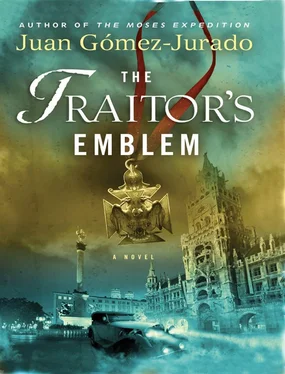Juan Gomez-Jurado - The Traitor's emblem
Здесь есть возможность читать онлайн «Juan Gomez-Jurado - The Traitor's emblem» весь текст электронной книги совершенно бесплатно (целиком полную версию без сокращений). В некоторых случаях можно слушать аудио, скачать через торрент в формате fb2 и присутствует краткое содержание. Жанр: Триллер, на английском языке. Описание произведения, (предисловие) а так же отзывы посетителей доступны на портале библиотеки ЛибКат.
- Название:The Traitor's emblem
- Автор:
- Жанр:
- Год:неизвестен
- ISBN:нет данных
- Рейтинг книги:4 / 5. Голосов: 1
-
Избранное:Добавить в избранное
- Отзывы:
-
Ваша оценка:
- 80
- 1
- 2
- 3
- 4
- 5
The Traitor's emblem: краткое содержание, описание и аннотация
Предлагаем к чтению аннотацию, описание, краткое содержание или предисловие (зависит от того, что написал сам автор книги «The Traitor's emblem»). Если вы не нашли необходимую информацию о книге — напишите в комментариях, мы постараемся отыскать её.
The Traitor's emblem — читать онлайн бесплатно полную книгу (весь текст) целиком
Ниже представлен текст книги, разбитый по страницам. Система сохранения места последней прочитанной страницы, позволяет с удобством читать онлайн бесплатно книгу «The Traitor's emblem», без необходимости каждый раз заново искать на чём Вы остановились. Поставьте закладку, и сможете в любой момент перейти на страницу, на которой закончили чтение.
Интервал:
Закладка:
Now it’s time to change all that, she thought, going out onto the street.
Her leather boots left dirty tracks in the snow, but the blizzard took care of that, wiping them out as it raged by.
19
On the day he was attacked, Paul and Hulbert showed up at their first delivery an hour late. Klaus Graf was white with rage. When he saw Paul’s battered face and heard his tale-corroborated with constant nodding from Hulbert, whom Paul had found tied to his bed, humiliation etched across his face-he sent him home.
The next morning Paul was surprised to find Graf at the stables, a place he almost never visited before the end of the day. Still confused by recent events, he didn’t notice the strange look the coal man was giving him.
“Hello, Herr Graf. What are you doing here?” he asked cautiously.
“Well, I just wanted to make sure that there wouldn’t be any more problems. Can you assure me those boys won’t be coming back, Paul?”
The young man hesitated a moment before replying.
“No, sir. I can’t.”
“That’s what I thought.”
Klaus rummaged in his coat and pulled out a couple of wrinkled, dirty banknotes. He handed them guiltily to Paul.
Paul took them, doing the sums in his head.
“A portion of my monthly salary, including today. Sir, are you dismissing me?”
“I’ve been thinking about what happened yesterday… I don’t want any problems, you understand?”
“Of course, sir.”
“You don’t seem surprised,” said Klaus, who had deep bags under his eyes, doubtless from a sleepless night trying to decide if he should dismiss the lad or not.
Paul looked at him, wondering whether to explain the depth of the abyss into which he was being cast by the bills in his hand. He decided against it, because the coal man already knew his plight. He opted instead for irony, which was increasingly becoming his currency.
“This is the second time you’ve betrayed me, Herr Graf. Betrayal loses its charm the second time around.”
20
“You can’t do this to me!”
The baron smiled and sipped his herbal tea. He was enjoying this situation, and what was worse, he was making no attempt to pretend otherwise. For the first time he could see the possibility of getting his hands on the Jew’s money without having to marry off Jurgen.
“My dear Tannenbaum, I don’t see how I’m doing anything at all.”
“Precisely!”
“There’s no bride, is there?”
“Well, no,” Tannenbaum acknowledged reluctantly.
“So there can’t be a wedding. And since the lack of a bride,” he said, clearing his throat, “is your responsibility, it’s reasonable that you should be taking care of the costs.”
Tannenbaum shifted uneasily in his seat, searching for a response. He served himself more tea and half the sugar bowl.
“I see you take it sweet,” said the baron, arching an eyebrow. The revulsion Josef produced in him had slowly been transformed into a strange fascination as the balance of power shifted.
“Well, after all, I’m the one who’s paid for this sugar.”
The baron responded with a grimace.
“There’s no need to be rude.”
“Do you think I’m an idiot, Baron? You told me you’d use the money to set up a factory to manufacture rubber products, like the one you lost five years ago. I believed you and transferred the vast sum you asked me for. And what do I find two years later? Not only have you not set up the factory, but the money’s ended up in a portfolio of stocks to which only you have access.”
“They’re reliable stocks, Tannenbaum.”
“That may be. But I don’t trust their keeper. It wouldn’t be the first time you’d wagered your family’s future on a winning hand.”
Baron Otto von Schroeder’s face assumed a look of offense that he couldn’t bring himself to feel. Lately he had contracted gambling fever again, and had spent long nights staring at the leather folder that contained the investments he’d made with Tannenbaum’s money. Each one had an instant liquidity clause, which meant that he could convert them into wads of banknotes in little over an hour with only his signature and a stiff penalty. He didn’t try to fool himself: he knew why the clause had been included. He knew the risk he was running. He’d started drinking more and more before bed, and the previous week he’d returned to the gaming table.
Not at the Munich casino; he wasn’t that stupid. He had disguised himself in the most modest clothes he could find, and visited an establishment in the Altstadt. A cellar with sawdust on the floor and whores with more paint on them than you’d find in the Alte Pinakothek. He asked for a glass of Korn and started at a table where the opening play was just two marks. He had five hundred in his pocket, the maximum he would allow himself to squander.
The worst thing possible happened: he won.
Even with those filthy cards that stuck to one another like newlyweds on a honeymoon, even with the drunkenness brought on by home-brewed drink and the smoke that stung his eyes-even with the unpleasant smell that hung in the air of that basement-he won. Not a lot-just enough for him to leave the place without a knife in his guts. But he had won, and now he felt an itch for the game more and more frequently. “I’m afraid that on the matter of the money you’ll just have to trust my judgment, Tannenbaum.”
The industrialist gave a skeptical laugh.
“I see that I’m going to be left with no money and no wedding. Though I could always redeem that loan letter you signed for me, Baron.”
Schroeder gulped. He wouldn’t allow anyone to take away the folder in his study drawer. And not for the simple reason that the dividends were gradually paying off his debts.
No.
That folder-the act of stroking it, of imagining what he could do with the money-was the only thing that got him through the long nights.
“As I said before, there’s no need to be rude. I promised you a wedding between our families, and that’s what you’ll get. Bring me the bride, and my son will be waiting for her.
Jurgen hadn’t spoken to his mother for three days.
When the baron had gone to collect his son at the hospital a week earlier, he had listened to the young man’s profoundly biased tale. He’d been pained at what had happened-even more than when Eduard returned so badly mutilated, Jurgen thought stupidly-but he had refused to involve the police in the matter.
“We mustn’t forget that the boys were the ones who brought the penknife,” said the baron, justifying his stance.
But Jurgen knew that his father was lying, and that he was hiding a more important reason. He tried to talk to Brunhilda, but she dodged the subject again and again, confirming his suspicions that they were telling him only part of the truth. Infuriated, Jurgen shut himself away in total silence, believing that this would soften his mother.
Brunhilda suffered, but she did not give in.
Instead she counterattacked, lavishing her son with attention, bringing him endless presents, sweets, and his favorite dishes. It reached the stage when even someone as spoiled, ill-mannered, and self-centered as Jurgen began to feel suffocated, eager to get out of the house.
So when Krohn came to see Jurgen with one of his usual propositions-that he should come along to a political meeting-Jurgen gave a different reply than he normally would.
“Let’s go,” he said, grabbing his overcoat.
Krohn, who had spent years trying to get Jurgen involved in politics, and who was a member of various nationalist parties, was delighted at his friend’s decision.
“I’m sure it’ll help take your mind off things,” he said, still ashamed at what had happened in the stables a week earlier, when seven had lost to one.
Читать дальшеИнтервал:
Закладка:
Похожие книги на «The Traitor's emblem»
Представляем Вашему вниманию похожие книги на «The Traitor's emblem» списком для выбора. Мы отобрали схожую по названию и смыслу литературу в надежде предоставить читателям больше вариантов отыскать новые, интересные, ещё непрочитанные произведения.
Обсуждение, отзывы о книге «The Traitor's emblem» и просто собственные мнения читателей. Оставьте ваши комментарии, напишите, что Вы думаете о произведении, его смысле или главных героях. Укажите что конкретно понравилось, а что нет, и почему Вы так считаете.












